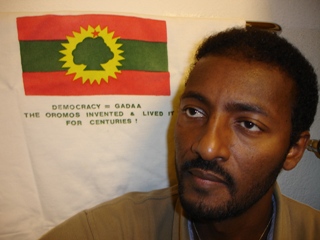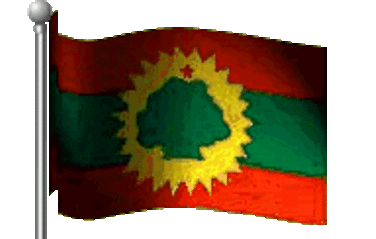A leading investigator of genocide in Africa, who worked for UNICEF, says that Ethiopia itself is a terrorist nation that is using the invasion to...
Editor’s Note: Ethiopia’s invasion of Somalia may be guided less by the war against Islamist terrorism and more by narrow territorial goals of the Addis Ababa government, writes Donal Brown, an asssociate editor at New America Media.
What’s Realy Behind Ethiopia’s Invasion of Somalia?
New America Media, News Analysis. Donal Brawn.
Ethiopia’s invasion of Somalia may have more sinister goals than meet the eye.
Keith Harmon Snow, a leading investigator of genocide in Africa, who worked for UNICEF, says that Ethiopia itself is a terrorist nation that is using the invasion to gain legitimacy with its own people and the international community.
By fighting a patriotic war, the government seeks to mute opposition at home and criticisms of human rights violations and political repression.It also wants to divert criticism for its failure to comply with the World Court’s ruling to return disputed territory to Eritrea as well as consolidate its position in its land dispute with Eritrea.
Prime Minister Meles Zenawi claims the invasion aims to restore the United Nations-sanctioned government in Somalia and prevent Islamist forces from establishing a terrorist stronghold in the horn of Africa.
But those familiar with the situation in Somalia doubt it could ever provide a haven for Al Qaeda let alone jihadists coming from all over the Middle East. Most jihadists do not speak Somali and few speakArabic. They would stand out too much with their different eating habits and clothing. It would be difficult for a bone-poor country like Somalia tosupport an influx of foreigners.
The Somalians, who just want to end the constant fighting, are once again facing an uncertain future. The Islamists have faded away, discredited for shutting down schools and sending children to their deaths against the superior Ethiopian army. Never extremely religious anyway, Somalians now will have to contend with clans--more corrupt than the Islamists and prone to infighting—that have been restored to power.
In Addis Ababa, meanwhile, President Meles is facing big problems. He is losing the support of the Oromo people, backing that he needs to retain power. After the May 2005 elections, initially praised by the international community for the unprecedented participation of the opposition, Meles stifled inquiries into the legitimacy of the results. He reacted to public protests by jailing protesters, journalists, human rights workers and opposition leaders including the newly elected mayor of Addis Ababa. An independent inquiry revealed that Ethiopian security forces killed 193 unarmed protesters in 2005.
Ethiopia’s human rights record in the provinces is even more heinous, says Obang Metho of the Saskatchewan, Canada-based Anuak Justice Council, a human rights group seeking to protect the Anuak minority in Ethiopia. Metho says few people in Europe and the West realize what is going on in the shadow of Darfur.
“He [Meles] has been an agent of terror in Sidana, Ogalen, Oromo, Anhar, Tigray, Gambella [Anuak region] and continues to perpetuate brutality, oppression and suppression to his people throughout all of Ethiopia,” Metho says.
Metho claims that besides killing off the Anuaks, the Ethiopian national Defense Forces (ENDF) since December 15 had conscripted 600 to 700 young Anuak men and taken them to northern Ethiopia to train as soldiers. Many young men fled to the bush to escape conscription.
Metho and Snow agree that the Anuaks are facing genocide. Snow says Anuak rebels were allies of Meles in throwing out the hated Durgue government in 1991, but soon afterward, Meles turned against them.
Unable to conduct aid operations in Gambella, UNICEF commissioned Snow to do a report on the situation. In this poor and remote region, Snow found that, the ENDF was going into villages, destroying mud and straw dwellings and forcing the people to leave, under the pretext of weeding out terrorists.
“In August the military forcibly displaced all Anuak people from some 13 to 15 Anuak villages in the remote and already devastated regions,” Snow notes. Left with no options many Anuaks are going to larger towns or to southern Sudan and refugee camps in Kenya. People are restrained from moving about so it is difficult to attend school, gather firewood, travel to sources of water or conduct trade.
For an Anuak civilian, there is a “daily risk of being shot, raped, beaten, tortured or harassed,” according to the Harvard Law School’s International Human Right Clinic (IHRC) report on the situation in Gambella.
The Ethiopian government has been accused of trying to remove Anuak rebels from Gambella so that oil wells can be drilled. Snow says there are Chinese and Malaysian interests already setting up camps with electricity and clean water (amenities not available to Anuaks) and enticing local women into prostitution.
Metho says, “The Bush administration has never do anything [to recognize the atrocities in Gambella].” Metho wants the U.S. to put pressure on the Ethiopian government to ease up on the Anuaks and to investigate the killings.
Snow says all forms of support to the Meles government should be withdrawn. Angelina Jolie and others, he urged should stop adopting children from Ethiopia and stand up for the ordinary Ethiopiansunder threat of death from the government. He discourages African Americans from traveling to Ethiopia, their second most popular destination after Ghana. All aid organizations, he said, should pull out of Ethiopia.
“They [the aid workers] need to start talking about what they are seeing, that Ethiopia is a terrorist country,” says Snow.



0 Comments:
Post a Comment
<< Home